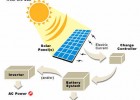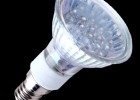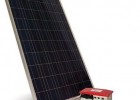EU China Solar PV Trade War
The EU China solar panel trade war is only one of the series of problems that have been plaguing the solar panel industry in the last few years. This industry in Europe has seen many highs and lows, raising a fair share of contentious issues in the recent past. However, in order to understand why the plan of imposing anti-dumping tariffs on China from June 6 is meeting with such stiff resistance, one needs to understand and have a look at the series of events that took place in the last few years.
In the year 2008, Solarworld, Germany’s largest solar industry company, showed a rise in their revenues by over 31 %, reaching the heights of €900 million. They had even expanded to North America by opening the largest solar panel plant in the continent. Four years later, in 2012, the company is going through major debt restructuring and is showing losses to the tune of €492 million. It is instances like these, which are not isolated in nature, which have led to the decision by EU to impose a 67.9 % levy on China for dumping panels in the European Union nations at below cost prices, leading to a crisis-like situation in the industry.
However, there are over a thousand companies that have jointly signed a petition to the European Commission stating that the imposition of levy of such high rates will result in a serious problem in the industry. The schism between the manufacturers and the installers and prospective buyers of these solar cells has become a major point of disagreement.
It is clear that many of the major manufacturers of the EU and USA blame the Chinese Government’s policy of subsidising the solar industry for the slowdown in the European & American solar industry, this is true to some extent. Many experts agree that unequal subsidise amongst international markets has had a negative effect on EU/US markets however, the EU nations have also been subsidising this industry to a great extent before the Chinese Policy in order to promote growth the green economy. Other market experts blame the glut in the market. The overproduction of the solar panels has had a massive negative effect crashing the price of solar cell around the globe.
Companies opposed to these tariffs have clearly feel that the proposed tariffs will have a detrimental effect on the entire solar PV value chain, without having a considerable positive effect on the EU solar panel manufacturers. Many in the industry believe that if cost-cutting measures were put into place and global cost rationalisation was also followed, then the industry would not have to rely upon detrimental tariff s to regulate the international market.
The imposition of high tariffs would affect all the smaller players in the industry greatly as these companies rely a lot upon the availability of low-cost solar panels in order to meet the cost expectations of their consumers. For example, the recent expansion of smaller portable solar panel chargers would be greatly affected by this tariff making these accessories inaccessible and financially impossible to source at low-cost. It could also have a negative effect on the research and innovation section of this accessories industry. This could effectively destroy a developing sector of the solar market reducing the innovations of specialised solar technologies in solar chargers for laptop, phones etc…
It is quite clear that unless there can be an international agreement on the subsidies of solar manufactures that this argument will continue and Government will impose tariffs and other such methods to protect their own solar manufacturers in the global market.





